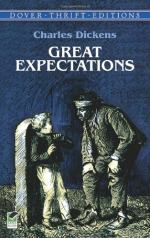Although I was looking at Biddy as I spoke, and although she opened her eyes very wide when I had spoken, she did not look at me.
“Oh, his manners! won’t his manners do, then?” asked Biddy, plucking a black-currant leaf.
“My dear Biddy, they do very well here—”
“Oh! they do very well here?” interrupted Biddy, looking closely at the leaf in her hand.
“Hear me out — but if I were to remove Joe into a higher sphere, as I shall hope to remove him when I fully come into my property, they would hardly do him justice.”
“And don’t you think he knows that?” asked Biddy.
It was such a very provoking question (for it had never in the most distant manner occurred to me), that I said, snappishly, “Biddy, what do you mean?”
Biddy having rubbed the leaf to pieces between her hands — and the smell of a black-currant bush has ever since recalled to me that evening in the little garden by the side of the lane — said, “Have you never considered that he may be proud?”
“Proud?” I repeated, with disdainful emphasis.
“Oh! there are many kinds of pride,” said Biddy, looking full at me and shaking her head; “pride is not all of one kind—”
“Well? What are you stopping for?” said I.
“Not all of one kind,” resumed Biddy. “He may be too proud to let any one take him out of a place that he is competent to fill, and fills well and with respect. To tell you the truth, I think he is: though it sounds bold in me to say so, for you must know him far better than I do.”
“Now, Biddy,” said I, “I am very sorry to see this in you. I did not expect to see this in you. You are envious, Biddy, and grudging. You are dissatisfied on account of my rise in fortune, and you can’t help showing it.”
“If you have the heart to think so,” returned Biddy, “say so. Say so over and over again, if you have the heart to think so.”
“If you have the heart to be so, you mean, Biddy,” said I, in a virtuous and superior tone; “don’t put it off upon me. I am very sorry to see it, and it’s a — it’s a bad side of human nature. I did intend to ask you to use any little opportunities you might have after I was gone, of improving dear Joe. But after this, I ask you nothing. I am extremely sorry to see this in you, Biddy,” I repeated. “It’s a — it’s a bad side of human nature.”
“Whether you scold me or approve of me,” returned poor Biddy, “you may equally depend upon my trying to do all that lies in my power, here, at all times. And whatever opinion you take away of me, shall make no difference in my remembrance of you. Yet a gentleman should not be unjust neither,” said Biddy, turning away her head.
I again warmly repeated that it was a bad side of human nature (in which sentiment, waiving its application, I have since seen reason to think I was right), and I walked down the little path away from Biddy, and Biddy went into the house, and I went out at the garden gate and took a dejected stroll until supper-time; again feeling it very sorrowful and strange that this, the second night of my bright fortunes, should be as lonely and unsatisfactory as the first.




